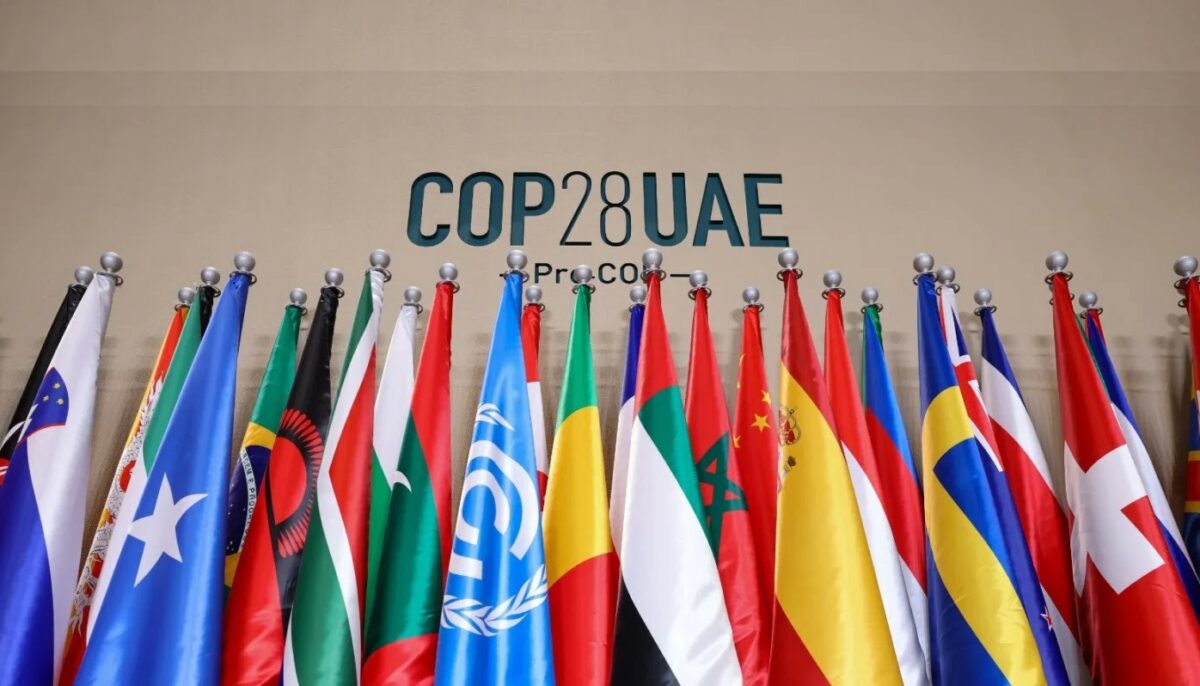Last June, it was reported that the UAE’s national oil company read emails to and from the COP28 climate summit office in Dubai. The COP28 office then claimed the email system used is “independent” and “separate” from that of Abu Dhabi National Oil Company (ADNOC). However, technical analysis showed that the office shares email servers with ADNOC.
In a controversial move, the UAE appointed Sultan Al Jaber, ADNOC’s CEO, as president of the COP28. Al Jaber’s background in oil and his dual role as COP28 president and ADNOC CEO have already drawn criticism as this constitutes a conflict of interest given that fossil fuel emissions are one of the most prominent causes of global warming.
Dubai is gearing up to host the 28th United Nations Climate Change Conference of the Parties of the UNFCCC (COP28) from November 30 until December 12, 2023.
According to SMEX researcher, a broader perspective around the event shows that it is part of the greenwashing campaign the UAE has been carrying out for years.
Greenwashing is the practice whereby states or companies make controversial claims regarding their commitment to environmental protection to attract more business or benefit from lesser scrutiny. In other words, the concerned party exploits one of the most critical causes for activists and the youth and orchestrates a massive marketing campaign, promoting the country as a liberal state that respects modern values and freedoms, as the UAE has done.
Prisoners of Conscience for a Simple Tweet
Many UAE citizens and residents are still imprisoned simply for practicing their right to express their opinion and their advocacy for human rights.
On November 24, the European Union called upon UAE authorities to immediately release Emirati human rights defenders and activists held in Abu Dhabi prisons ahead of the COP28.
The resolution demanded the immediate release of UAE human rights defenders Ahmad Mansoor, Muhammad Al-Roken, Muhammad Al-Mansouri, and Nasser Bin Ghaith, in addition to dozens, if not hundreds, of Emirati and foreign detainees, charged with the “crime” of expressing their opinion and advocating for human rights.
In a report published last July, Amnesty International stated that “Since 2011, the UAE has become a closed space for civil society, with laws that criminalize peaceful dissent through expression, association or peaceful assembly, and the imprisonment of dozens of Emirati dissidents.”
Authorities subjected 94 defendants to a mass trial (the “UAE 94” case) in July 2023, which resulted in 69 prison sentences. They dissolved the boards of two government-licensed professional associations (the Jurists Association and the Teachers Association).
The same report stated that: “The authorities have kept the victims of that mass trial in prison for over a decade, continuing to arbitrarily extend their detention past the end date of their prison sentences under a counterterrorism law.” This allows for their indefinite detention for “counter-extremism counseling.”
In March alone, UAE authorities arrested ten Lebanese nationals without charging them, including Ghazi Ezzedine (50 years old), who died under torture in an Emirati prison on May 4. His family was only informed five days after his death, and his son was not allowed to see the deceased’s face to identify the body.
On November 24, UAE authorities took the sudden and arbitrary decision to indefinitely deny Lebanese detainees the right to meet their families, offering no explanation for the reasons.
SMEX Policy Analyst Dionysia Peppa stated: “The decision to hold the COP28 in the UAE, despite its proven history of human rights violations, should not go unnoticed. According to the United Nations Committee against Torture, the UAE exercises a pattern of torture and mistreatment against human rights activists and people charged with crimes against the state’s security.”
“Now, the UAE is attempting to mislead public opinion by hosting an event on climate change to cover up its flagrant disrespect of human rights,” she added.
Oppression by Force of Law
The Emirati Constitution guarantees freedom of expression. Article 30 stipulates that “Freedom to hold opinions and express them orally, in writing or by other means of expression shall be guaranteed within the limits of the law.” However, this text strongly contradicts other articles in the Penal Code and the Personal Data Protection Law, effective January 2022.
Neither of these laws restricting the freedom of expression has been repealed since the UAE was named COP28 host. The text of the Host Country Agreement, which will specify whether these laws will be applied on the conference grounds, is still under wraps.
For instance, according to Article 176 of the 1978 UAE Penal Code, “any individual who insults the President of the State shall be punished by no less than 15 years and no more than 25 years of imprisonment, in addition to a fine.”
Article 180 of the same law criminalizes the establishment, formation, organization, or management of an association, body, organization, or any affiliated office aimed at overthrowing the regime. This “crime” is punished by death or life imprisonment.
Article 197 enforces restrictions on the right to protest and applies to all means of publication. It sanctions “whoever participates in a gathering to prevent or obstruct the implementation of the laws or statutes, should this endanger public peace.”
“Violators” are punished by a fine and a prison sentence of up to 10 years. The same article also sanctions “whoever makes use of any means of communication or information technology or any other means, to diffuse information or news or to instigate to do acts that lead to expose the State security to danger or are incompatible with public policy.”
Article 198 expands the scope of penalties to include a prison sentence of no less than one year against “whoever deliberately diffuses false or tendentious news, information or rumors, or spreads provocative propaganda should it lead to disturbance of public security, cause panic among people or be prejudicial to the public interest.”
Meanwhile, the UAE Personal Data Protection Law threatens the security and safety of citizens and violates their privacy. It contains exemptions and exceptions that limit its scope, create room for personal data violations, and increase the risk of unchecked surveillance. The law also makes exceptions for government data and does not apply to state institutions that control and process personal data.
The law’s articles do not apply to the following types of data: personal data held by security and judicial authorities, private health data, and personal banking and credit data, which are subject to legislation regulating their protection and processing.
Moreover, in the Ranking Digital Rights evaluation of 12 of the world’s most powerful telecommunications companies based on their policies and practices affecting people’s rights to freedom of expression and privacy, “Etisalat” came in last due to its “lack of transparency across all categories.”
According to the RDR report, in addition to the oppressive organizational environment created by the company in its local markets, “Etisalat” did not explicitly disclose how it responds to government demands to restrict content and share user information, whether from UAE authorities or governments of the foreign countries in which it operates.
UAE laws also include the death penalty, despite demands by the United Nations to abolish it. The UN affirms that: “The use of the death penalty is not consistent with the right to life and the right to live free from torture or cruel, inhuman or degrading treatment or punishment.” How, then, can a state that still imposes the death penalty on those who establish associations host the COP28?
According to the UN safeguards guaranteeing protection of the rights of those facing the death penalty: “In countries which have not abolished the death penalty, capital punishment may be imposed only for the most serious crimes, it being understood that their scope should not go beyond intentional crimes with lethal or other extremely grave consequences.”
A History of Spying, Surveillance, and Violations
The UAE has invested heavily in spyware and content moderation software to impose an exclusive, pro-regime rhetoric. This explains why many oppose the country hosting an event such as COP28, as opponents note that behind this façade of economic growth and respect for the environment lies a tyrannical authority using technology to strengthen the state’s oppressive hold.
The UAE has often used surveillance technology, such as the Israeli Pegasus spyware developed by NSO Group and Evident, a mass surveillance tool developed by the British defense company BAE Systems. This spyware has facilitated the identification of opponents, journalists, and human rights defenders, hacking into their accounts inside and outside the UAE.
The country has also invested in establishing spying firms and initiatives locally, such as DarkMatter, which operates under the guise of a “cyber-security” company and is believed to be behind ToTok, a messaging and video calling app that turned out to be a government spying tool capable of tracking the conversations and images of its users. In 2016, the UAE worked with Israel on launching Falcon Eye, an Israeli-installed civil surveillance system, in Abu Dhabi.
In 2021, the Pegasus leaks showed that in 2018, the UAE spied on members of the Yemeni government, former President Abdrabbuh Mansur Hadi, and former Prime Minister Ahmed Obaid Bin Dagher. This was done through malware in cooperation with NSO, the Israeli developer, which includes members of the Mossad and the Israeli army.
In 2019, “A team of former US government intelligence operatives working for the UAE hacked into the iPhones of activists, diplomats, and rival foreign leaders with the help of a sophisticated spying tool called Karma,” whose developer is unknown.
Five former operatives and program documents stated, “The cyber tool allowed the Gulf country to monitor hundreds of targets beginning in 2016, from the Emir of Qatar and a senior Turkish official to a Nobel Peace laureate human-rights activist in Yemen.”
Last April, The Citizen Lab, a specialist cybersecurity organization, revealed that Israeli spyware was used to hack into the phones of journalists, opponents, and human rights organizations in ten countries, using internet servers, one of which is located in the UAE.
According to the investigation, the hack was performed using surveillance software developed by the Israeli company QuaDream, which specializes in developing iPhone hacking software. The founder is a retired Israeli military intelligence officer.
The UAE was also among the states that bought Predator, a software capable of gaining complete control over the mobile phones it hacks. This includes accessing private messages and files, recording phone calls, and detecting the surrounding environment through the camera and microphone, in addition to all the other features of Pegasus.
In October 2022, during the COP27 in Egypt, several Egyptian activists called for protests against the violations of the Egyptian government and in support of Alaa Abdul Fattah, who had been held in pre-trial detention for years, concurrently with the COP27 in Sharm el-Sheikh. Consequently, human rights violations were detected during the COP27. Security forces erected checkpoints in the streets to search the mobile phones of citizens and detain all those who had anti-government content.
With the upcoming COP28 in the UAE, people can neither protest nor tweet. As a result, many are questioning the criteria based on which countries are selected to host the conference of the parties. These criteria seem ambiguous and raise many questions that international parties must address.



